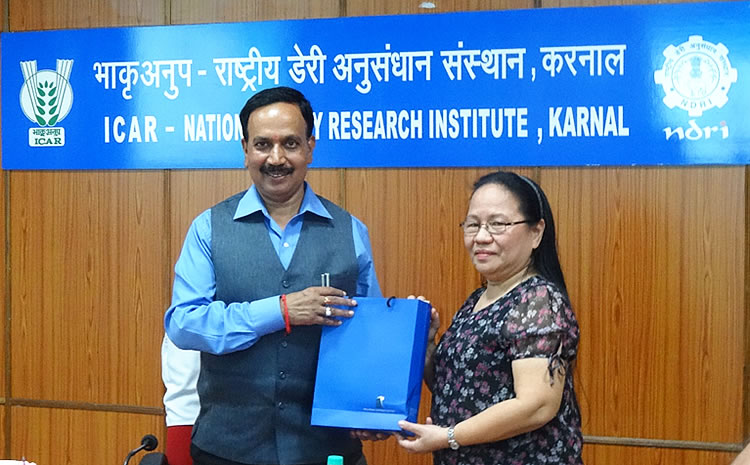The study mission, the first in a series, was organized by the Southeast Asian Regional Center for Graduate Study and Research in Agriculture (SEARCA) through the Training Unit of its Knowledge Management Department. The regional office of the International Livestock Research Institute (ILRI) in India, through Dr. Alok Jha, Regional Representative-South Asia, served as co-organizer of the study mission.
The study mission is part of the project titled Capacity Development under Livestock Research and Biotechnology Research and Development of the Carabao Development Program (CDP), which SEARCA is implementing for PCC. It aims to enhance the capacity of the PCC to address the requirements of the Carabao sub-sector and enhance its full potential as a major player of the livestock industry and the region considering the ASEAN Economic Community 2015 and greater globalization. The study mission also aims for the participants to: 1) identify relevant and specific overseas public and private sector program concepts and strategies needed to strengthen the “i-REB” (Intensified Rural Enterprise Build-Up) framework and its operationalization; and 2) forge stronger partnership with international research and development institutions that will enhance generation of major final output relevant to improving productivity through the application of relevant biotechniques, technology transfer, and policy reform.
India is the largest milk producing country in the world, producing 17.2 percent of the total world milk production. India’s prime strengths in the world livestock sector are as follows: first in milk production, third in egg; sixth in broiler; first in buffalo; and second in goat and cattle production.
While in India, the group visited the National Dairy Research Institute (NDRI) and National Bureau of Animal Genetic Resources (NBGAR) in Karnal; Central Institute for Research on Buffaloes (CIRB) and Lala Lapjat Rai University of Veterinary and Animal Science (LANUVAS), both in Hissar; Mother Dairy and Delhi Milk Scheme plants in New Delhi; and Rohtak Milk Union (Vita Plant) and Balab Village, both in Rohtak District. The visit to Rohtak district was coordinated by the National Dairy Development Board (NDDB).
The NDRI showcased its livestock facility that develops feed stuff to reduce emission gases. The NDRI has already produced cloned animals – a cloned calf they called Mahima, which came from another cloned calf called Garima-II.
At the Balab village, participants interacted with villagers /buffalo farmers and observed milk recording under the Progeny Testing Project. They also observed how farmers did the online data entry through the netbooks that the project had given them.
Participants will explore possible collaborative activities with NDRI, CIRB, and NDDB.
Participants in this study mission included Dr. Ester B. Flores, National Coordinator for Genetic Improvement Program; Dr. Annabelle S. Sarabia, Chief of Operations; Dr. Eric P. Palacpac, Chief of Knowledge Resource Management and R&D Coordinator; Dr. Edwin C. Atabay, PCC Director, Central Luzon State University; Prof. Franklin T. Rellin, PCC Director, Cagayan State University; and Mr. Jerome M. Balaoing, Head of Information and Communication Technologies Section (ICTS). They were accompanied by Ms. Nova A. Ramos, Program Specialist, KMD-TU, who served as the Study Mission Coordinator. (Nova A. Ramos)

